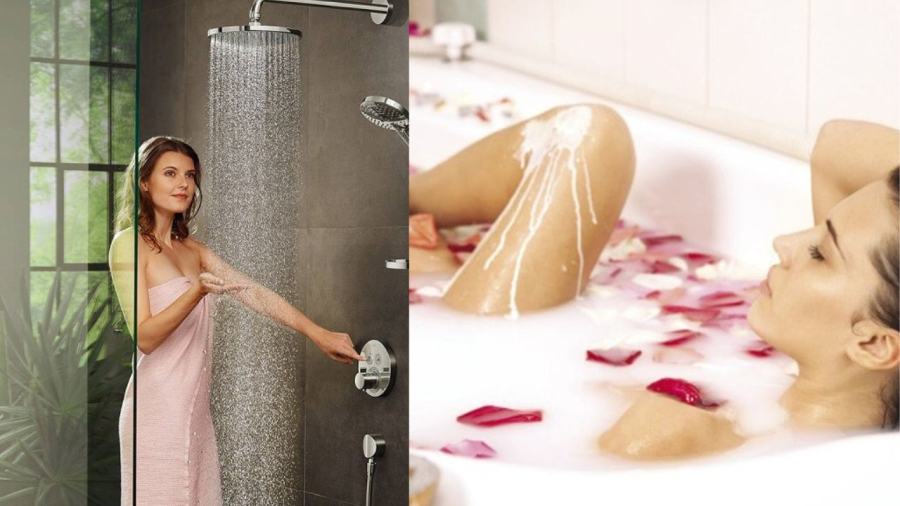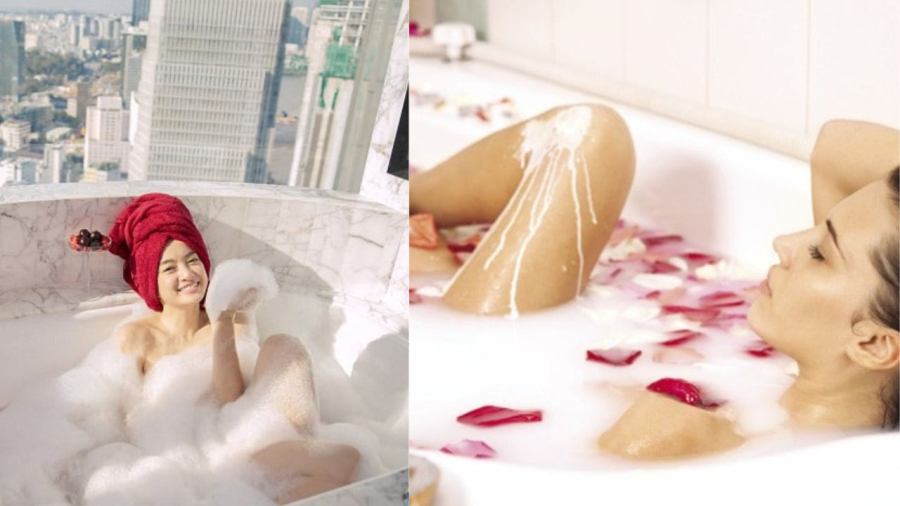The cold weather makes bathing an activity that requires attention to avoid harm to health. Bathing helps clean the body, improve skin beauty, and also protect health. However, careless bathing can make people sick. Especially in the freezing winter, which bathing method will provide more warmth?
Bathing in a bathtub or using a shower?
Internal medicine doctor Niket Sonpal (New York, USA) stated that bathing with a shower or bathing in a bathtub both have advantages and disadvantages, so the choice of bathing method depends on each situation.

Advantages and disadvantages of showering
– In the freezing winter, standing under a continuous flow of water from the shower helps you feel warm, not afraid of the cold. Just let warm water stream on your body and rub it gently, you won’t feel cold.
– Low cost of showering: Showering is cheaper than bathing in a bathtub, and using a shower is usually for quick showers that save a lot of water compared to bathing in a bathtub, thus more economical. The design of the shower is simple and compact, suitable for bathrooms.
– Time-saving: Winter is the time when we should shower quickly, so showering allows you to be more proactive in managing your time. If you’re too busy, you just need to adjust the water temperature and stand under the shower to start showering.
– Suitable for everyone: A showerhead is a convenient tool for all age groups from adults to the elderly and children.
– Showers also have a massaging effect: The water jets from the showerhead have different pressure compared to lying in a bathtub or pouring water in small amounts. Moreover, in winter, using warm water enhances the massaging effect on the skin, helping to regulate blood circulation. This stimulates acupuncture points and increases blood circulation. Therefore, many people like to shower using a showerhead to enjoy this massaging feeling. Using a showerhead to wash your hair also stimulates the scalp, helping to reduce headaches caused by stress. However, if the showerhead is set too high and the water pressure is too strong when it hits the face, it may increase the risk of dry skin.
Showering also has some disadvantages:
– Easy to absorb heavy metals such as manganese: Prof. John Spangler of Wake Forest University (USA) warned about the risk of inhaling manganese gas released from water when showering with a showerhead for both children and adults after calculating the amount of manganese a person inhales when showering with a showerhead every day for 10 years. The longer you shower, the more manganese you inhale. If the showerhead is left without cleaning, the level of this metal will be higher.
– Increased risk of bacterial infection: The showerhead is constantly moist, so it is a habitat for many bacteria. Scientists have found bacteria that cause lung inflammation in showerheads. Therefore, if you are not careful about cleaning the showerhead, it can increase the risk of infection, especially from bacteria such as pseudomonas aeruginosa causing respiratory infections and mycobacterium avium causing lung disease. When you use a showerhead, the bacteria are dispersed into the air and can be inhaled.

Advantages and disadvantages of bathing in a bathtub
Bathing in a bathtub brings you the following advantages:
– If you want to soak, winter is the right time for hot water immersion. However, soaking for a long time in a stagnant bathtub without water circulation will lower body temperature. So, actually, a bathtub is not suitable for soaking in winter like in summer.
– When adding water to the bathtub, you can add aromatic herbs, salt, etc., to create a therapeutic bath that helps improve beauty, treat diseases, and promote health. Especially in winter, you need to take herbal baths.
– Stress reduction: Immersing yourself in a bathtub regularly helps reduce stress and fatigue. Soaking in the bathtub soothes the nerves and your mood after a stressful day. A 2018 study showed that people who soak in warm water daily feel less tired, stressed, and depressed compared to those who only shower using a showerhead. In addition, soaking in a bathtub increases blood flow and promotes metabolic processes to eliminate toxins.
– Pain relief support: Bathing in a bathtub also helps relieve pain from hemorrhoids, regulates body temperature, and exfoliates dead skin cells.
The disadvantages of bathing in a bathtub include:
– In winter, the water quickly cools down, so immersing yourself in a bathtub cannot be extended because the water will become cold, and soaking in cold water can cause chills.
– Time-consuming: You have to wait for the bathtub to fill up, and it is not possible to soak for a long time in winter.
– High cost: Bathtubs and the water consumption are more expensive than using a showerhead so you will have to spend more money on utilities.
– Expensive: Bathtubs take up quite a bit of space, require a spacious apartment, and also require more initial investment for purchasing and installation.
– Not suitable for everyone: People with mobility issues, including the elderly, will encounter many difficulties when entering and exiting the bathtub.
– Not carefully cleaning the bathtub also increases the risk of bacterial infection. Moreover, if someone in the family has a skin disease, they cannot share the bathtub.
Notes on showering and bathing in the winter
Winter weather is cold and easily reduces body temperature, so whether you shower or bathe, you should not shower/bathe for too long, as it can easily cause colds. Moreover, no matter how you bathe, pay attention to keeping the showerhead and bathtub clean to avoid bacterial infections.
Ensure the water temperature is suitable for bathing to avoid feeling cold or too hot.
































